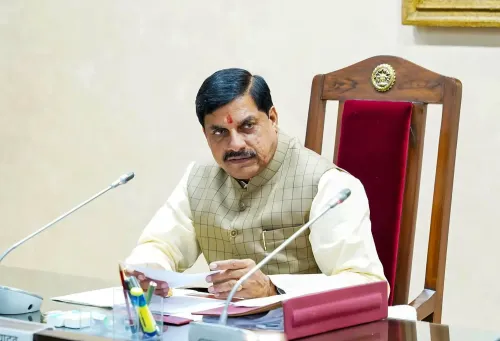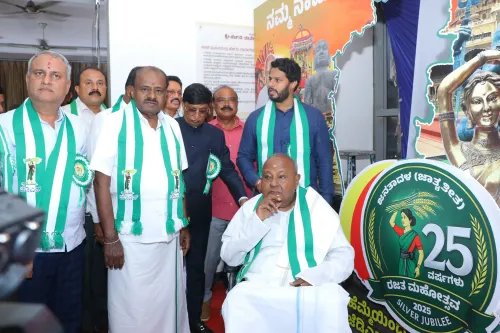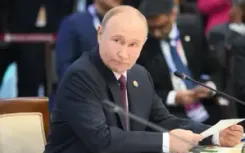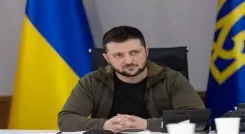How Can We Unite Gita’s Liberation with Constitution’s Liberty?

Synopsis
Key Takeaways
- True independence requires both political freedom and inner liberation.
- Unity is crucial in overcoming internal divisions that weaken the nation.
- Spiritual clarity is essential for the responsible exercise of rights.
- The Gita emphasizes knowledge before action, guiding us towards true liberation.
- Awareness of internal adversaries is vital to prevent external domination.
New Delhi, Aug 15 (NationPress) As the nation commemorates its 79th Independence Day on Friday and Janmashtami on Saturday, philosopher and author Acharya Prashant emphasized the importance of integrating the Gita's call for inner liberation with the liberty enshrined in the Constitution. He asserted that India's political freedom achieved in 1947 remains unfinished without this spiritual union.
In a profound message shared on the eve of Independence Day, the philosopher highlighted the necessity of unity, stating, "Although we are all Indians, divisions based on caste, religion, ideology, region, or language transform compatriots into outsiders and outsiders into enemies. Such divisions undermine our collective strength."
He further elaborated, "History demonstrates that when a community is preoccupied with dividing itself into insiders and outsiders, it becomes vulnerable to external domination. A nation that is fractured internally is an easy target for outside forces."
Prashant also articulated that genuine independence encompasses both spiritual liberation and the freedom of thought.
He pointed out the significant coincidence of Independence Day and Janmashtami falling closely together this year, suggesting a deeper meaning: the inseparability of the nation's well-being and true spirituality.
"Independence precedes Janmashtami. This sequence signals that while outer freedom may come easily, inner liberation is more challenging yet fundamentally essential," he remarked.
He emphasized that this unique alignment is intentional, noting, "Just as there is no gap between the 15th and the 16th, there is no genuine gap between the nation’s welfare and authentic spirituality. It suggests that political and inner freedom must coexist harmoniously."
"Independence Day signifies liberation from foreign oppression, while Janmashtami reminds us of Krishna's message to liberate ourselves from the shackles of the mind. Both forms of freedom are vital; one without the other is insufficient," he stated.
"Independence Day represents liberation from one external oppressor — the British. In contrast, Janmashtami confronts us with six internal oppressors: lust, anger, greed, delusion, pride, and envy — all residing within us," he noted.
Prashant explained that while political independence ended external domination, it did not free us from "the bondage of greed, fear, and ignorance." Without overcoming these internal adversaries, even rights and liberties can be exploited to deepen our enslavement.
"This is evident globally today: Where inner liberation is lacking but outer freedoms are plentiful, individuals frequently act recklessly under the guise of free will," he observed.
Quoting the Gita, he asserted that true freedom is "action grounded in clarity, not compulsion." He warned, "In the absence of inner liberation, outer freedom can become perilous. A person enslaved by fear, greed, or delusion will misuse their rights to fortify their own chains."
"On the battlefield of Kurukshetra, Krishna did not instruct Arjuna to flee the fight nor to engage out of anger. He urged for action free from bondage — that is true liberation. Without it, even a politically liberated nation cannot realize its full potential," Acharya Prashant stated.
"Remember, before the 18 days of battle came 18 chapters of the Gita: knowledge precedes action. Arjuna was not paralyzed by the external enemy but by his internal fears and attachments. Krishna first provided him clarity, then urged him to fight. Knowledge must come before action; otherwise, even the bravest warrior may falter," he added.
He emphasized that liberty of thought is intrinsically linked to spiritual liberation. "You cannot be inwardly free while being outwardly enslaved to borrowed notions. Nor can you think freely if constrained by fear, prejudice, or unexamined beliefs. Liberation and liberty must coexist," he remarked.
He cautioned that history reveals that nations falter when they neglect the Gita's teachings. "Despite having the numbers, resources, and the world’s most profound philosophy, we lost our freedom. Such a loss occurs only when the internal message is disregarded," he stated.
"How could a vast nation with abundant resources be subdued by distant islands at a time when they lacked today's technological advancements? Such a downfall is possible only when a populace forgets the inner strength their own supreme wisdom provides," he added.
Drawing a comparison between the chains of colonialism and today’s subtler chains, he stated, "In 1947 we broke free from political chains. Today, we must liberate ourselves from inner chains — consumerism, sectarianism, and unthinking imitation. Without this, freedom remains hollow."
He emphasized, "A people that neglect the foes within their hearts, while solely focusing on external adversaries, risk repeating the circumstances that once led to their subjugation. If we disregard these internal enemies, history will recreate the very conditions for foreign domination. Subjugation never occurs by chance; it begins when individuals forsake self-awareness and succumb to their inner adversaries."
He warned that national independence, devoid of spiritual insight, faces the risk of internal collapse. "Political freedom without self-governance of the mind leads to conflict, corruption, and the misuse of rights. The Gita holds us accountable not just for our actions but for our thoughts and intentions," he stated.
Calling for what he termed "inner swaraj," he urged citizens to dissolve false identities, live authentically, and act from understanding rather than compulsion. "Look into the mirror," he advised. "Examine what beliefs, prejudices, and fears drive you, and question their origins and truths."
He concluded, "Truth is the only strength. One who stands with truth may face physical harm but can never be defeated."
"This is the genuine celebration of Independence Day and Janmashtami: More than just raising flags or performing rituals, it involves introspection to uncover what governs us and attaining liberation through truth."
"Let patriotism transcend mere emotion; let it cultivate a rise in awareness. Let us intertwine the Gita’s liberation with the Constitution’s liberty. Only when political swaraj is anchored in spiritual liberation will India’s freedom be assured," he asserted.
He concluded that the true commemoration of both days is the synthesis of outer and inner freedom. "Be liberated citizens in a free country, but also unshackled beings in your minds. That is the essence of complete independence," he stated.









